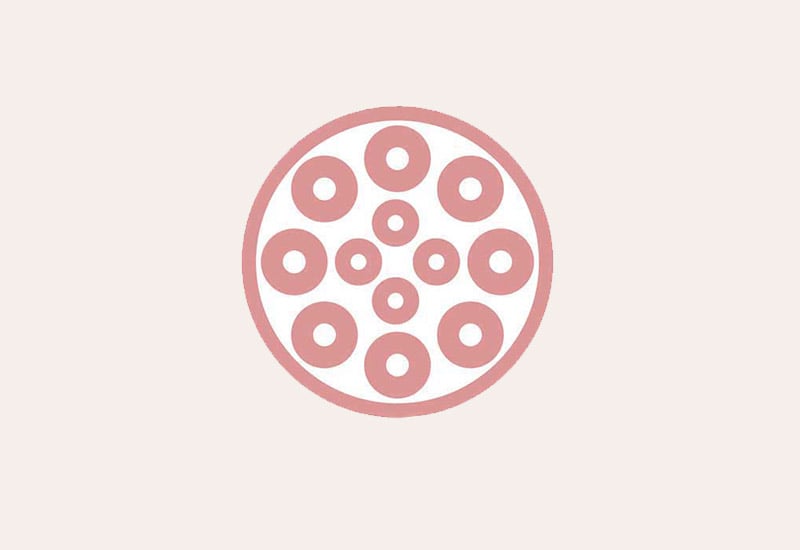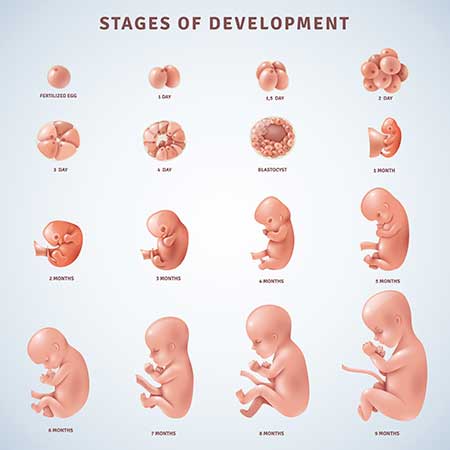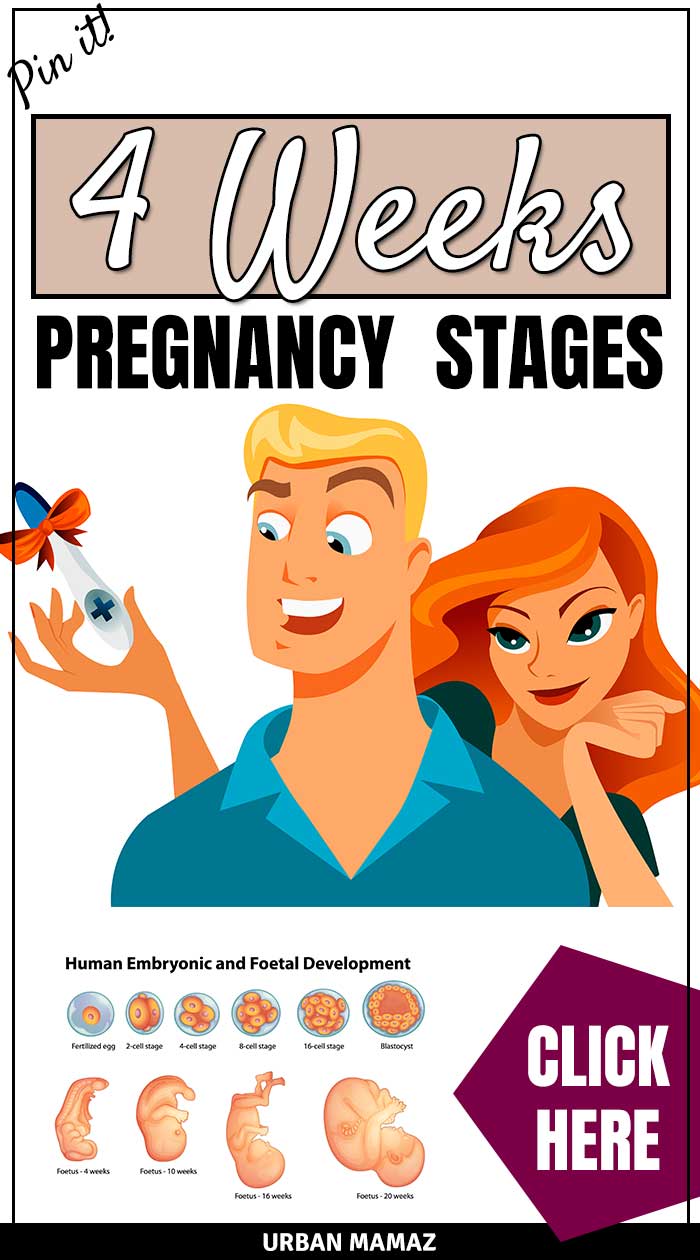Week by Week Pregnancy Guide: 4 Weeks
4 weeks of pregnancy may seem like nothing is going on and you may begin to wonder whether you are pregnant. Unknown to you is that your soon-to-be-baby has already found a home. The blastocyst has concluded its journey from the fallopian tube to the uterus.
Irrespective of your level of surety in the last 3 weeks of your pregnancy, when you are 4 weeks pregnant, it becomes so glaring to you that some major changes have taken place within you. The signs you would notice by now include vomiting, nausea, absence of your menstrual periods and a few others.
By this time that you are 4 weeks pregnant, the blastocyst is expected to have made its journey from your fallopian tube into its new resident and permanent place of abode known as your uterus until delivery. Once the blastocyst is in the uterus, it burrows into the uterine lining and implants. This is the mark of the unbreakable connection that will last for the next eight months and the lifetime after that. And the moment the embryo settles in your uterus, it will then go through a great moment of divide whereby it will split into two groups.
While the first half of the embryo will form what will be called your son or daughter, the other half will become the placenta. The placenta is called your baby’s lifeline. It is that special tissue that will be delivering the nutrients that your baby must have and the oxygen it needs to keep alive throughout the process of your pregnancy stage.
Another important function that the placenta will perform is that it will take care of the wastes from your baby. This means that it will carry the waste away to where it will be delivered for a push out.
And as for the other embryo forming into the real baby, it will begin to create the neural tube that the brain of the baby as well as the spinal cord and the backbone will form eventually. But then, there are other cells that will come in later to form other parts of the baby like the skin, muscles, and a host of others.
The cells responsible for these developments in the baby are grouped into three and are the ectoderm, mesoderm and the endoderm. While the ectoderm (i.e. outer layer) will take care of the formation of the hair, eyes, skin, brain, and the nervous system of the baby; the mesoderm (middle layer) will make up the muscles, kidneys, tissues, blood system and the skeleton of the baby; and the endoderm (inner layer) will end up as the internal organs of the baby.
Your body at 4 weeks of pregnancy
At 4 weeks which is just approximately one month, your body is still gearing up. Some women experience pesky PMS-like early pregnancy symptoms like mood swings and cramping while other women may not feel a thing.
In addition, on your own part as the mother to be, it is likely that your belly will bloat a little or you may not even appear as pregnant yet. Then, there is the possibility that your body will be producing HCG (Human Chorionic Gonadotropin) which may make you begin to feel some nausea, or morning sicknesses like light-headedness, fainting, exhaustion, and mood swings.
More so, you may soon discover that your breasts are becoming tender and that the nipples are also becoming more sensitive. You may or may not have some spotting this week. If you do, it only sends the message to you that the embryo has found its footing (implanted itself) on the wall of your uterus. So, you don’t have to worry.
Then, you are likely to find out that your senses of smell and taste have become extra sensitive.
Can you test positive at 4 weeks?
By the time you’re 4 weeks pregnant, you can usually get a clear positive on a urine pregnancy test. It’s is a funny thing, but your egg may have only been fertilized in the last two weeks. Still, the dating for pregnancy begins with the start of your last menstrual period. This is the reason why sometimes pregnant women test negative in their 4 weeks of pregnancy.
Related:
PREGNANCY TEST: HOW DOES IT WORK AND WHEN SHOULD YOU TAKE IT?
How does your stomach feel when you’re 1 month pregnant?
In 4 weeks pregnant, the pregnancy hormone progesterone can cause your tummy to feel full, rounded, and bloated.
Does ultrasound show 4 weeks pregnant?
The gestational sac contains amniotic fluid and surrounds the embryo. You may see the gestational sac in ultrasound as early as 4 1/2 t 5 weeks of pregnancy.
Is there a heartbeat at 4 weeks pregnant?
Hearing a baby’s heartbeat for the first time is an exciting milestone for new moms-to-be. A fetal heartbeat may first be detected by a vaginal ultrasound as early as 5 1/2 to 6 weeks after gestation. That’s when a fetal pole, the first visible sign of a developing embryo, can sometimes be seen.
Is it normal to be really tired at 4 weeks pregnant?
It’s totally normal to be tired at 4 weeks pregnant and feel like you need a nap. Fatigue is one of the main symptoms of early pregnancy, and it’s no wonder – you’re growing a brand new person inside your body!
Implantation bleeding
You might find yourself spotting this week. The spotting may begin right around the time that you would have had your period or even earlier. It should not be a cause of alarm. The spotting or light bleeding is usually a sign that the embryo has implanted itself into the uterine wall, which is a good thing.
In case you don’t notice any bleeding or spotting, it should not be a cause of worry either. It is only 25% of women who experience implantation bleeding.
Failing to have this symptom does not mean that you are not pregnant. For women who experience implantation bleeding, it can be accompanied by symptoms like mild cramping, a woozy feeling, swollen breasts, and a headache.
Implantation bleeding can often occur before you test positive for a pregnancy test so it can be hard to tell whether the light bleeding is an early sign of pregnancy or just normal spotting leading to your period.
Unfortunately, there is no conclusive way to find out but the best way to know whether you are pregnant or not is to wait a few more days and take a pregnancy test. The timing of your last sexual encounter should also help you figure it out.
Related:
WHAT ARE THE CAUSES OF BLEEDING AND SPOTTING IN PREGNANCY
HOW TO STOP VAGINAL BLEEDING OR SPOTTING DURING PREGNANCY?
Your due date
Most pregnancies last around 40 weeks (or 38 weeks from conception), so typically the best way to estimate your due date is to count 40 weeks, or 280 days, from the first day of your last menstrual period. Another way to do it is to subtract three months from the first day of your last period and add seven days. There are online due date calculators, like this one here, that will do the work for you.
What’s next?
Prenatal screening tests you should take during the first trimester
Your health care provider may recommend a variety of screenings, tests, and imaging techniques during your pregnancy. These tests are designed to provide information about the health of you and your baby to help you optimize your child’s prenatal care and development.
First-trimester screening tests are a combination of fetal ultrasound, urine test, and maternal blood testing. This screening process can help determine the risk of the fetus having certain birth defects. These tests may be used alone or with other tests. Read more about first-trimester screening tests here.
Prenatal Vitamins
Prenatal vitamins are important before and during pregnancy to help your body meet the demands of pregnancy and aid in your baby’s development. They help to promote the development of the baby’s teeth and bones. Prenatal vitamins contain vitamin Folic Acid, Iron, Calcium, Vitamin D, and more. Ask your doctor about what you should take. They may also suggest that you take them when you begin to plan for pregnancy, as well as while you’re pregnant.
Nutrition During Pregnancy
It’s very important to maintain a healthy pregnancy. Eating a nutritious diet during pregnancy is linked to good brain development, a healthy birth weight, and can reduce the risk of many birth defects. A balanced diet will also reduce the risk of anemia (a condition in which you lack enough healthy red blood cells to carry adequate oxygen to your body’s tissues), as well as other unpleasant pregnancy symptoms such as fatigue and morning sickness.
How many calories should you eat during pregnancy?
You should aim to eat about 2000 calories a day in the first pregnancy trimester, though your practitioner may recommend more depending on your weight and activity level. This number is pretty on par with typical adult nutrition recommendations, which means that you should continue eating as usual during the first trimester. As your pregnancy progresses and your belly grows, you may need to increase your daily calorie intake. During the second trimester, an additional 340 calories a day are recommended. For the third trimester, the recommendation is 500 calories more a day than when not pregnant. You can talk to your healthcare provider about your personal nutritional needs.
Best foods for the first trimester:
- Lean meat – A good source of iron.
- Yogurt – A good source of calcium and protein.
- Kale – A good source of nutrients, including fiber, calcium, folate, iron, vitamin C, vitamin A, vitamin E, and vitamin K.
- Bananas – A good source of potassium.
- Edamame – A good source of protein.
- Beans and lentils – A good source of iron, folate, protein, and fiber.
Foods to avoid during pregnancy
One of the most important things you should know when you’re pregnant is that there are foods you shouldn’t eat. It can be a real bummer if you’re a big sushi, coffee, cocktails, or a rare steak fan. Thankfully, there’s more you can eat than what you can’t. Some of the foods and drinks you should avoid eating during pregnancy are:
- Undercooked or raw fish and meat
- Raw eggs
- Organ meat
- Alcohol
- Caffeine
- Unwashed vegetables
- Unpasteurized milk, cheese, and fruit juice
- High mercury fish
You can read more information about food and beverages you should avoid during pregnancy here.
Related:
MEAL PLANNING BUNDLE AND RECIPE BINDER
Can you lose weight during pregnancy?
Losing some weight during pregnancy might be possible and even beneficial for some women who are extremely overweight or obese. However, losing weight isn’t recommended for pregnant women who are at a healthy weight before pregnancy. If you want to lose weight during pregnancy, make sure to read this super useful article about how to lose weight during pregnancy safely.
Exercise during pregnancy
Physical activity is important for everyone, including women who are pregnant. Staying active during pregnancy can help you have a more comfortable pregnancy, feel better, reduce the risk of complications, and prepare you and your body for birth. Strong muscles and a fit heart can greatly ease labor and delivery. So, if you were already physically active before your pregnancy, it’s healthy to keep it up.
Unless your doctor instructs you otherwise, these activities usually are safe during pregnancy:
- Walking
- Swimming and water workouts
- Riding stationary bikes
- Pilates or Yoga classes
- Strength training
- Low-impact aerobics classes
Read more about safe exercises during pregnancy here.
It’s important to note that there are exercises that you should avoid when pregnant, you can read more information about them here.
PMS-like symptoms vs. pregnancy symptoms
Premenstrual syndrome (PMS) is a combination of emotional, physical, psychological, and mood disturbances that occur after a woman’s ovulation, typically ending with the onset of her menstrual flow. It includes depression, crying, oversensitivity, mood swings, fatigue, bloating, breast tenderness (mastalgia), acne, and appetite changes with food cravings.
About 90% of women experience premenstrual symptoms at some point in their lifetime.
For certain women, the symptoms of PMS may be similar to those of early pregnancy, although this is highly individual.
If you are pregnant, pregnancy hormones can really affect you. These are hormones on a rampage that are coursing through your body. They can cause everything and anything from moodiness and bloating to mild cramping.
The main pregnancy hormones include:
- Follicle-stimulating hormone which is the first among the many hormones and is necessary to launch the pregnancy and is there even before you conceive
- Luteinizing hormone which orchestrates menstruation but is inactive during pregnancy itself
- HCG which steps into amp up the production of estrogen and progesterone while suppressing the immune system to support the growing baby
- Estrogen which helps the uterus grow and triggers the development of baby’s organs
- Progesterone which encourages breast tissue growth and softens the ligaments in labor preparation
- Relaxin which relaxes the muscles and ligaments in preparation of labor
- Placental growth factor which promotes blood vessel growth
- HPL which prepares your breasts to breastfeed
- Oxytocin which stimulates labor contractions
- Prolactin which causes your breasts to increase in size and eventually produce milk
It is important to know these hormones because it will prepare you for the reactions they produce in your body.
4 weeks of pregnancy is a milestone that just reminds you of the other 36 more weeks to come. A lot of changes in your body that you may not even know but you should be prepared for.
Have you announced your pregnancy yet?
If not, here are a few creative ideas for pregnancy announcement:
PREGNANCY ANNOUNCEMENT IDEAS FOR HUSBAND
PREGNANCY ANNOUNCEMENT IDEAS FOR PARENTS AND FAMILY
PREGNANCY ANNOUNCEMENT IDEAS AT WORK
PREGNANCY GUIDE
Follow Your Pregnancy Week-by-Week
2 |
3 |
4 |
5 |
6 |
|
7 |
8 |
9 |
10 |
11 |
12 |
13 |
14 |
15 |
16 |
17 |
18 |
19 |
20 |
21 |
22 |
23 |
24 |
25 |
26 |
27 |
28 |
29 |
30 |
31 |
32 |
33 |
34 |
35 |
36 |
37 |
38 |
39 |
40 |
41 |










